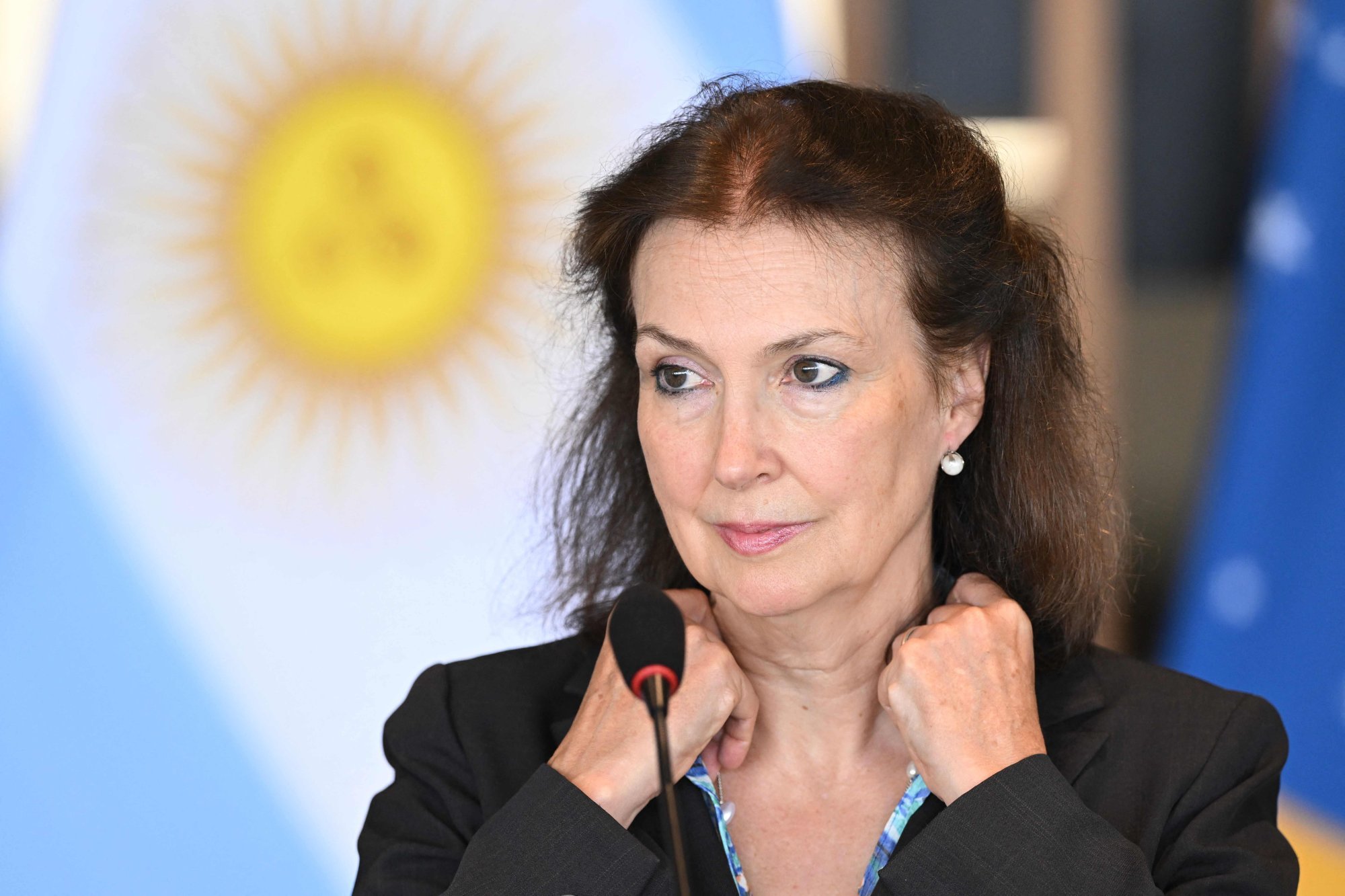
Argentinian foreign minister’s visit to China may signal effort to stabilise ties after President Javier Milei’s pivot to US
- Diana Mondino’s trip has triggered speculation that she is looking to extend a currency swap with Beijing as the risk of a 10th sovereign debt default looms
- Milei threatened to cut ties with Beijing on the campaign trail and has strongly pivoted towards the US since taking office
Mondino will be accompanied by financial officials – including Central Bank President Santiago Bausili and Secretary of Finance Pablo Quirino and the foreign ministry’s secretary of international economic relations, Marcelo Cima – triggering speculation that she may be hoping to convince Beijing to renew a currency swap to boost Argentina’s dwindling foreign reserves.
Milei, an economist and a right-wing libertarian, threatened to cut off ties with China during his campaign and since taking office, has strongly pivoted towards the United States while pursuing radical economic reforms.
Earlier this month, his government sent a delegation of scientists and experts to inspect China’s deep space observation station in Neuquén Province in Argentina’s south after US officials described it as a military installation.
Why a speech by Argentina’s Javier Milei strikes a chord in China
Gonzalo Ghiggino, a researcher at Argentina’s National Scientific and Technical Research Council, said “the real reason” for Mondino’s visit is to extend part of the currency swap between the two countries’ central banks that is due to expire in June.
“This is for the moment the most important issue – vital for Argentina – between the two countries,” Ghiggino said.
The country has been mired in an economic crisis since 2002 and defaulted on its sovereign debt for a ninth time in 2020. There have been growing fears that another default will take place under Milei’s watch.

Its US$18 billion swap line with China is the main source of foreign reserves for its central bank’s depleted coffers, but US$5 billion of this is due to expire in June.
The deal is also the biggest yuan swap line in the world, as Beijing is steadily pushing a wider use of yuan to counter the dominance of the US dollar and to expand its global influence.
“The Argentine government has a serious problem finding financing from other sources. Even the IMF said no to a new loan” said Ghiggino.
“If the Chinese government doesn’t agree to extend the expiration date, the Argentine government could face a very strong crisis.”
China ranks as Argentina’s second largest trading partner, behind only Brazil. It is the largest buyer of Argentinian soybeans and beef, and a key investor in lithium, an electric-vehicle battery metal. Argentina owns the world’s largest share of salt-lake lithium resources, 21 per cent of the global total.
China cuts tariffs on 143 Argentine products amid tense bilateral ties
Jiang Shixue, a professor at Macau University of Science and Technology, said Mondino’s visit should help stabilise relations.
“Some of Milei’s remarks and actions have indeed created some uncertainty in the future of China-Argentina relations, but I think a cooperative relationship benefits both sides as it has in previous decades,” Jiang said.
But China’s strong presence in the country has drawn suspicions from the US. During a recent visit to Argentina, General Laura Richardson, who heads US Southern Command, warned that Beijing’s expanding influence in Latin America and the Caribbean “could present increasingly greater threats” to the US.
She also claimed the Chinese space station in Neuquén Province could provide the PLA with “global tracking and surveillance capabilities” which “could translate into global military capabilities”.

In a statement, the Chinese embassy in Argentina said Richardson’s remarks were “absurd to the extreme and lacking in minimum respect for China and Argentina”.
“The countries of Latin America and the Caribbean, including Argentina, are independent and sovereign States, not the backyard of the United States,” the statement said.
“The Government and the people of Argentina have the wisdom and the ability to choose partners that serve their interests.”
Mondino will be accompanied by dozens of businesspeople and investors on her visit to Beijing and Shanghai, where she will “have a number of official meetings and a tight schedule of trade promotion events and meetings with investors”, according to the Argentine foreign ministry.
Argentina asks to join Nato as a ‘global partner’
It also said Mondino would be holding working meetings with high-ranking Chinese officials, including her Chinese counterpart Wang Yi to discuss “the main bilateral matters”.
Beijing has confirmed the visit will run for four days. Foreign ministry spokesman Wang Wenbin said that both countries are “important emerging economies”, adding: “China is ready to work with Argentina to deepen mutual political trust and to promote the stable development of the China-Argentina comprehensive strategic partnership”.

